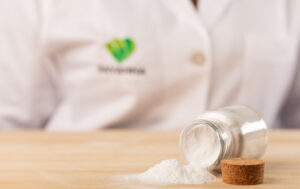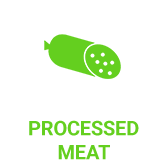Calorific value kcal/g
Glycaemic index
Insulin index
Sweetness
Our cellobiose
Cellobiose is the basic building block of cellulose and a purely plant-based renewable resource. In nature, cellobiose occurs in pine needles, honey, and corn. In production, we mainly rely on sugar beet as raw material source. Cellobiose is not only characterized by the fact that it is very similar to lactose. Due to its special technological properties, it can be used in many ways: from food to non-food segments and from cosmetics to fine chemicals.
A real all-rounder

- Disaccharide, formed from 1,4-ß-glycosidically linked glucose molecules
- Limited water solubility: 14 % at room temperature
- 100% biodegradable
- Calorific value: 4 kcal/g
- Glycaemic Index: 27
- Insulin Index: 13
- Proven tooth friendly

- Good tolerance (guideline daily consumption: 0.5 g per kg body weight)
- Sweetness: 20 % compared to sucrose
- Neutral taste
- Positive influence on the product texture and body in the finished product
- Can be used in different food and non-food applications, e.g. meat products, cosmetics, compressed products or fine chemicals
- GMO-free, made in Germany
Is cellobiose biodegradable?
The test to determine the biodegradability of cellobiose was conducted ... read moreThe test to determine the biodegradability of cellobiose was conducted by an accredited contract laboratory in accordance with an internationally recognised OECD testing method: the Zahn-Wellens-Test (method: 302 B: 1992). The Zahn-Wellens-Test is described in the Test Methods Regulation (EC) No. 440/2008, Part C, Method C.9 for the Registration, Evaluation, Authorisation and Restriction of Chemicals (REACH).
The test results showed that cellobiose is 100 % biodegradable.
Is cellobiose gluten-free?
Our cellobiose is gluten-free ... read moreJa, unsere Cellobiose ist glutenfrei.
Our Cellobiose is gluten-free. In no part of our operations do we use or add wheat, rye, barley, oats, or any of their by-products. We would be happy to send you a copy of our gluten statement if required.
Is cellobiose available as an organic product?
Following the entry into force of the new European organic regulation ... read moreFollowing the entry into force of the new European organic regulation VO (EU) 2018/848 on 01.01.2022, the production of organic food using ion exchange and absorption resin processes is only possible in exceptional cases (art. 23 Regulation (EU) 2020/464 and art. 7 Regulation (EU) 2018/848). Currently, the production of cellobiose is not feasible without the use of these processes.
For this reason, we are unfortunately unable to offer organic cellobiose in the EU.
Is cellobiose toxic for pets?
Results of our studies show that both cats and dogs ... read moreResults of our studies show that both cats and dogs tolerate cellobiose very well.
Prebiotic effects of cellobiose have even been proven in dogs and cats.
Funding project
SAVANNA is engaged in work on functional carbohydrates, in particular cellobiose, and was supported by a publicly sponsored project. The Federal Ministry of Food and Agriculture in Germany is supporting the research project in the context of a national initiative to reduce the consumption of fat, salt and sugar.
 „Was sponsored by the Federal Ministry of Food and Agriculture by resolution of the German parliament.“
„Was sponsored by the Federal Ministry of Food and Agriculture by resolution of the German parliament.“
Your contact
Photo credits
All pictures: © SAVANNA Ingredients




